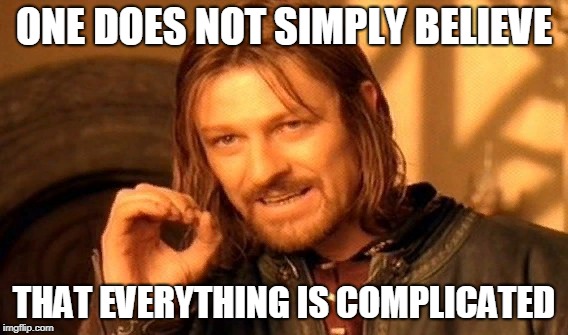A myth:
“It is not important how to believe, it is important to be a good person.” This thesis is repeated in different forms, it is attributed to different famous people. Dogmatism, faith, attending church and praying are something insignificant, even superfluous. It is only important to be a good person.
In fact:
Let us clarify first: what is actually “important” and what does it imply “to be a good person”?
When we name something “important”, we always draw upon some values and goals, knowingly or not. If you want to lose weight, you should avoid overeating. If you want to pass an exam, it is important for you to study diligently. If you want to fly to Vladivostok, it is important for you not to miss your flight. If you want to be trusted, it is important to keep promises.
“Important” implies “for something”, some purpose which it is important for. When we say: “in life, it is important to…” we assume that life has a goal.
If atheists are right, then nobody has created us, the universe is fundamentally meaningless, there is no purpose to it, we have originated from a long unravelment of impartial and extra-perceptual cosmic forces that did not want nor could want us to originate. In this case, there is simply nothing genuinely or objectively important – something may be important for me personally, something for you personally. Nevertheless, this is a matter of our personal tastes, which would be pointless to argue about.
Therefore, the question of what is truly important suggests in itself that there is some meaning in the universe and in our life. We have a goal that is important to achieve, a mission that is important to fulfill. The question of importance is inevitably a religious matter.
Just as a question of what is good. We often use the word “good person” as “a convenient, safe neighbor, whom we may expect no nasty things from”. But a convenient neighbor who suits everyone and a “good person” are not always the same. Somewhere in ancient Phenicia, where it was customary to burn babies as a sacrifice to Baal, the priest of the cult could suit his fellow citizens as a relatively comfortable and convenient neighbor. He wasn’t doing anything socially unacceptable. To suit everyone in one’s environment and to be a good person are two different things.
Alternatively, let us take a modern example. An Australian philosopher Peter Singer not only supports abortion, but also advocates infanticide – that is, the killing of already born babies. At the same time, his environment considers him a respected person of a high moral character – and, probably, he is quite a safe, convenient neighbor.
Is Peter Singer a good person? His fellow atheist, Richard Dawkins, is positive about it. Many other people are not so positive. So how do we determine who is “good”?
We cannot answer this question without understanding the criteria of good and evil. And these criteria are inevitably determined by what our belief is regarding the structure of the universe, and the true good, and the purpose of a man.
If we accept the picture of the world of the same Singer and other atheists, then there is simply no “true good”. The unravelment of meaningless natural processes has created a man, and these processes do not and cannot have any goals for him or her. If it is the case, “to be a good person” can only mean “to suit one’s surroundings”.
But if we suppose that the universe is meaningful, that human life has its goal and purpose, the question of “what it means to be a good person” depends on what this purpose is and how we obtain it. This is inevitably a religious matter. And it very much depends on how we believe.
It can be said that “to be a good person” means to wish our neighbors good. Then, however, it is very important to understand what is good for a man.
If earthly life is everything a person has, if there is no eternal salvation and any ideas of eternal life are illusory, then it matters not what kind of illusion a person adheres to. It would not matter anyway.
But if eternal life is real, then it is the single greatest blessing man can acquire. Infinitely more important than health, longevity, wealth or whatever else. Whether you believe in this eternal life or not will greatly affect what you think is “good.” And if it is important for you to be a good person, you will try to find out what is true.
But perhaps the most important example, which debunks the myth of that it doesn’t matter how to believe is the personality of Jesus Christ. When we start reading the Gospel, we meet the Man who had unique claims. He said that He was before the world was. That He and God are one. (John 10:30) That He will judge all peoples on the last day. And that our eternal life – or eternal death – is determined by faith (or disbelief) in Him. As He said to His disciples, “He that believeth and is baptized shall be saved; but he that believeth not shall be damned” (Mark 16:16).
Without a doubt, He considered it important how to believe. Of course, you may not believe Him – but this is also a religious choice, which also has its consequences. What you find important or unimportant, good or bad, is inevitably determined by whether you did believe Him or not.
Who benefits from this myth
This myth is incredibly popular because it reflects one of the clearest evidences of our corruption by sin: fleeing the truth. It is pretty easy to consider oneself a good person, after all, one is not Genghis Khan or Hitler. It is a pleasant thought and does not oblige one to anything. The truth, however, is dangerous, it may require one to acknowledge one’s wrong and change one’s life. And this is what we tend to hide from, just as fallen Adam hid from God in Paradise.
And the Gospel is the Good News of that when we stop hiding and come to the light, God will forgive us, accept us and work with us patiently until He makes us really, truly good.
Translated by Kirill Nikolaev

















